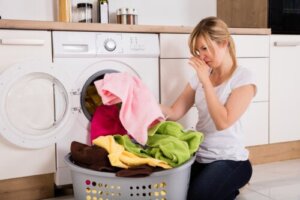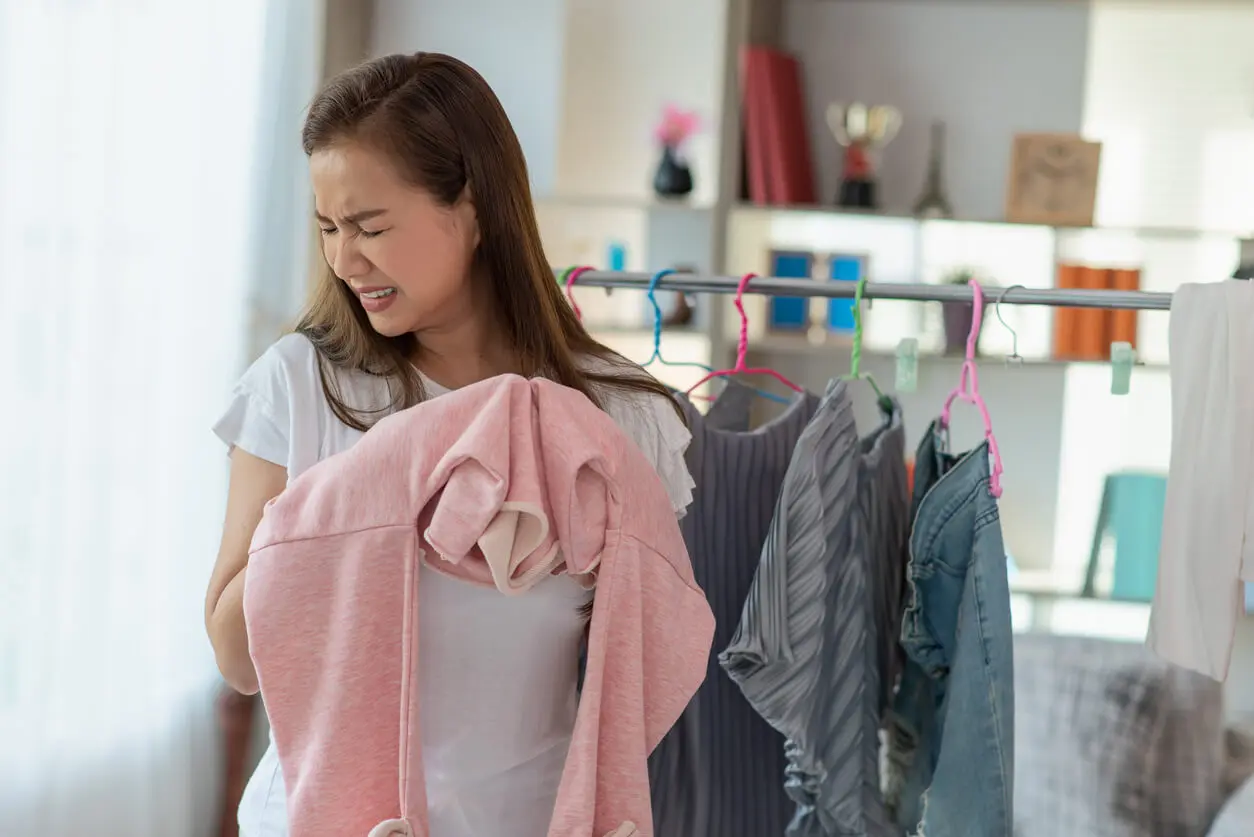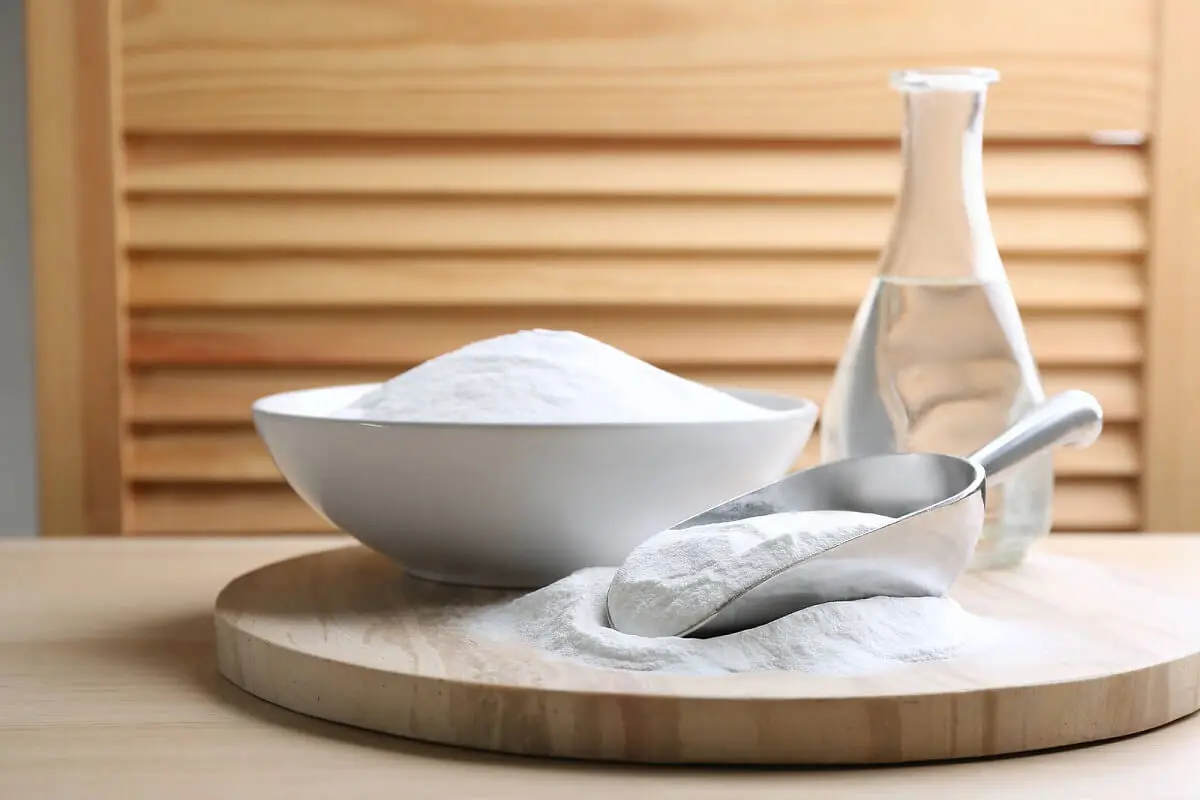8 Mistakes that Cause Bad Smelling Clothes

Did you know that you may be making some mistakes that cause bad smelling clothes? In general, having clothes with a pleasant smell and texture allows us to feel good. Clothes, which have direct contact with our skin, give us the pleasure of feeling clean and well presented.
That’s why it’s very uncomfortable when our clothes have a bad odor. But what causes this situation, and why do they stop smelling good despite regular washing? There are several factors that contribute to this problem. Let’s take a look at them.
8 mistakes that cause bad smelling clothes
Many times we think that it’s enough to put some fabric softener or soap with smell in the washing machine to avoid bad smelling clothes. However, there are other things to keep in mind to keep our clothes from getting unpleasant odors. What are the mistakes to avoid?
1. Not washing clothes immediately
When taking off a garment, many people are in the habit of airing it out and putting it away for another use. However, ignoring washing can be a big mistake, especially if you have had a busy day and have been sweating.
With some textiles, it’s not enough to let it air out for the unpleasant odor to go away. On the contrary, the odor will become even more pervasive with each day that passes without washing. In addition, the odor can spread throughout your closet when you do this.
Plus, bacteria accumulate each time the unwashed clothes are used again. For this reason, it’s recommended to wash clothes often, especially those that come into close contact with the skin.

We think you may be interested in reading this, too: 10 Tips for Arranging and Organizing Clothes in Your Wardrobe
2. Putting bad smelling clothes directly in the washing machine
Another common mistake is to put clothes in the washing machine without first cleaning them by hand. It’s advisable to first scrub the clothes in the area of your armpits or in the parts that accumulate bad odors due to body fluids. This is also the case for underwear and socks.
3. Mix everything in the laundry
Generally, it’s a good idea to separate the clothes that are going to be machine washed according to the colors and type of fabric. However, if you’ve detected some clothes that smell bad, it’s best to do a wash only for them.
For example, sportswear should not be mixed with delicate or everyday clothes. In fact, it’s possible that if the’are mixed, they may end up transferring the bad smell from one to the other.
4. Store wet clothes
Another mistake that causes bad smelling clothes and textile items is storing them when they’re still wet. This is something that happens more frequently during the winter because clothes don’t dry as quickly.
However, this is a very serious mistake because humidity encourages the growth of microorganisms that leave a very bad odor. In fact, this odor is often quite difficult to eliminate.
The general recommendation is to ventilate and dry our garments very well before folding them and putting them in the closet. If we have a tumble dryer, it’s necessary to make sure that they’re completely dry.
Despite using a drying cycle, some garments may retain more moisture and need to be given extra ventilation before folding and storing.
5. Don’t spread the clothes quickly
When the washing machine is started, it’s important to take the clothes out of the machine as soon as the washing cycle is finished. Otherwise, the clothes tend to accumulate humidity and, therefore, a bad smell.
If for some reason you forget them, the best thing to do is to check if they’ve acquired an unpleasant smell. If so, they should be washed again on a short cycle.
6. Not cleaning your washing machine and dryer
Not maintaining your washing equipment is also a mistake. The best option is to go to an expert technician so that you can keep it in perfect shape. The professional will not only check your system, but will leave the equipment free of bacteria and dirt accumulated on the inside.
In addition to this, regular cleaning of the washer and dryer at home is a must. For example, vinegar can be applied to the rubber parts to prevent mold and mildew from growing on its surface.
7. Wearing your clothes for too long
Although not all the garments have to be washed in each use, it’s necessary to keep an eye on how often you wear them and for how long. For example, blue jeans are garments that can be worn several times before washing. However, don’t forget about the time between washes, because bacteria accumulate.
Likewise, food drippings and contact with other substances and odors can generate dirt and bad odor. Therefore, as far as possible, you should wear jeans a maximum of three times. The same applies to other garments such as jackets or coats.
For these latter garmets, for example, it’s a good idea to wipe them down with a cloth smeared with water and soap in the zone of the armpits in the time that passes in sending them to the dry cleaner’s.
8. Allowing your clothes to mix with other odors
In many apartments, the laundry area is not very large. Sometimes, it’s right next to the kitchen, so it’s very easy for food odors to permeate the garments.
For this reason, it’s necessary to plan your washing so that it doesn’t coincide with meal times, especially if you’re going to cook meat or fish. There should also be no contact with cigarette smoke or other substances.
Like this article? You may also like to read: How to Remove Wrinkles from Clothes Without Ironing
Bad body odor impregnated in bad smelling clothes
Although a bad smell in clothes can come from various sources, the most common reason is the smell of sweat. For this reason, sportswear is the most common type of garment to be impregnated with stench after exercise routines.
This bad smell is produced by the steam that comes out of the skin pores to stabilize the temperature and, on many occasions, it’s an unpleasant odor produced by bacteria and other hygiene or environmental factors.
In this regard, scientists from the British University of Northumbria, Chamila J Denawaka, Ian A Fowlis, and John R Dean set themselves the task of investigating the unpleasant sweat that permeates clothing.
According to their research, entitled “Origin, Impact, and Elimination of Foul Odor from Dirty Clothes,” six chemical elements are what generate this foul-smelling sweat. In addition, they identified the presence of certain bacteria that cause the strong odor.
In this regard, good body hygiene and the use of deodorants that prevent bad odor is essential to avoid the proliferation of these bacteria.

Use the right products
After learning several of the mistakes that cause bad odor in clothes, it’s necessary to remember the importance of using the right products for washing. Apart from the chemical options, alternatives such as white vinegar can help. Just add a splash when rinsing your clothes.
Baking soda and lemon are also excellent allies against bad odors. They not only help with excellent cleaning, but they are also antibacterial and help to leave the garments impeccable.
On the other hand, you can put in your closet sachets of potpourri that aromatize the garments, as well as use special fragrances for textiles.
All cited sources were thoroughly reviewed by our team to ensure their quality, reliability, currency, and validity. The bibliography of this article was considered reliable and of academic or scientific accuracy.
- Denawaka CJ, Fowlis IA, Dean JR. Source, impact and removal of malodour from soiled clothing. J Chromatogr A. 2016 Mar 18;1438:216-25. doi: 10.1016/j.chroma.2016.02.037. Epub 2016 Feb 15. PMID: 26898151. https://pubmed.ncbi.nlm.nih.gov/26898151/
This text is provided for informational purposes only and does not replace consultation with a professional. If in doubt, consult your specialist.








